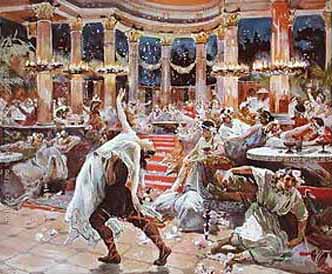 |
Manners, Customs, Clothing
Refinement and Sanctity
Prof. Plinio Correa de Oliveira
I received a request to show the relation between refinement in the way we treat others and sanctity. In my response, I will first establish some basic concepts.
What is treatment of others? One would say that in its first and immediate meaning, it is something external. It is constituted by an ensemble of formulas that express our inner attitudes toward others. So, good treatment involves two elements: the external protocol and the interior position.
The manners of courtesy are formulas of politesse, facial expressions, hand gestures, body posture, language, etc, that constitute the external elements of how we treat others.
Knowing how to treat others with benignity at times and at other times with force is something that cannot be found in a code of manners. Ways of acting that display fidelity, nobility or other moral qualities, depending on the occasion, is not something one learns in a book.

St. Francis of Sales stressed good treatment of others and excellent manners |
For example, a friend owes money to another friend; this relation involves a delicate treatment. Normally speaking, this relation is somewhat tense, and a man can take a more or less elevated stance, be more generous or less lenient in the manners he adopts in that relation. In such cases, his internal attitudes are more important than his actual manners.
Sanctity necessarily leads one to treat others in a very elevated way. When a person is a saint, his moral conduct is perfect and his behavior toward others is exemplary. He treats others with all distinction and respect as well as with all the strength and energy the circumstances demand. Sanctity is, thus, synonymous with a perfect treatment of others.
A fruit of Catholic Civilization
Can persons who are not saints treat others in an excellent way? Yes, it is possible as a remote fruit of Catholic Civilization. When a country had a long Catholic tradition, that tradition does not die overnight even when it apostatizes. Even though the morality in that country can decline rapidly, the tradition of good treatment of others may continue.
Let me draw on a metaphor St. Pius X used in another instance. We can put roses in a vase and their flagrance may linger for some days after they died and were removed from the room. In a similar way, some chivalrous and noble treatment toward others remains as a Catholic tradition in an environment that is no longer Catholic.
For example, some English lords still display a noble way of treating others as a fruit of the old traditions that came from the time when England was Catholic. This still exists, but it is dying. The normal fruits of Anglicanism are infidelity, treachery, adultery, arrogance and extravagance, which come from the character of its founder, Henry VIII.
So, both influences exist – the Catholic influence leading to distinction and elevation and the Anglican influence leading a lord to deceive his friend in order to steal his wife. Some remains of Catholic tradition still exist today in English customs, but they have become rigid, dry and artificial.
At depth, when persons no longer live in the state of grace, finesse in the treatment of others will shortly end. This splendorous way in dealing with others is like a plant whose life ends when its root is cut. For a while the plant still has the appearance of life and produces some flowers, but it is a transitory life present only in some of its branches. In fact, the plant is already dead and soon all its branches will wither.

Lord Mountbatten, Viceroy of India, and his wife: Splendorous appearance but rotten morality |
When society no longer has a true love of God, a genuine love of man cannot exist. Where there is neither true love of God nor love of man, good treatment of others in its highest form has to disappear.
Here is another metaphor to express this reality: Someone told me that it is known among doctors that the hair and nails of a person will still grow for a short time after he dies. In a similar way, good manners had a short spurt of life in Europe even after its apostasy. But it was something defective, already tending to perish. It is the remains of a magnificent thing that in effect has ceased to exist.
Good treatment, splendid manners
Is there a relation of causality between good treatment of others and manners?
Manners are formulas, gestures and external ways of being that express the mentalities of peoples. They are born naturally but, with time, acquire some arbitrary and conventional notes. A people can be very virtuous before it achieves perfect manners. It may have a very elevated treatment of others but only correct manners - perhaps even with some remnants of rudeness from its past. For example, some triviality, banality or lack of elegance may remain that don’t fit with good manners.
The manners of a saintly man can be less elevated than those of another man who is not a saint. Manners are slowly elaborated by civilizations. They are the product of the whole society. Perfection in the treatment of others ends by generating splendid manners. So, it is virtue that generates good treatment of others, and the latter generates good manners. Without virtue, manners are poor. When virtue dies, treatment of others becomes deformed. Nonetheless, some good manners may well continue to be employed since they are just external.
Perfect manners come from virtue
On the eve of the French Revolution in France, manners were extremely refined, but with an excessive artificiality that indicated they would die.
I believe a well-executed history of civilizations would prove that perfect manners only existed as fruit of Catholic Civilization. It may happen that one will sporadically find good manners here and there, but it will not be all-encompassing. Some peoples - the Chinese for instance - had aristocracies that in some instances developed excellent manners. The Romans and Greeks also had exceptional manners in certain things, for example, hospitality, to cite just one example. But those manners were good only in certain fields, they never acquired the elevation and extension that manners reached under Catholic Civilizations.
Think about a Roman banquet, for example. We can justly praise some points of Roman manners, but not when it comes to their banquets. The guests were all reclining on those half-chairs/half-beds that they called triclinium. There they would eat and drink as much as they could. When they could take no more food and wine because they were drunk and full, they would be carried out of the banquet hall to an ante chamber with large bowls.

At a Roman banquet at Emperor Nero's palace a woman is carried out of the room by a slave |
There were slaves in that room who would use feathers to tickle the throats of the guests so that they would expel from their stomachs all that they had eaten and drank. When that operation was finished, the guests would cleanse themselves with water and dry their hands in the hair of the women slaves. Others slaves would empty the filthy bowls so that the process might begin again. Then the guests would return to the banquet hall for another round of drinking and eating.
By night’s end, most of the guests had passed out on the floor of the hall or the garden grounds. Again it fell to the slaves to cleanse them, pick them up, and transport them to their own houses.
Notwithstanding the immoralities that were also practiced on those occasions, this kind of eating and drinking was completely indecent. How can anyone speak about manners in such an ambience? What kind of manners would guests employ in such deplorable situations? How could those guests treat the slaves - other human beings - like that?
Indeed, the Romans had a civilization that elaborated some good points regarding treatment of others and manners, such as their sense of glory for which they fought. However, as in most pagan civilizations, they also had other monstrous treatment of others and manners. Good manners do not encompass every field of human activity in pagan civilizations, as they do in a Catholic one.
I could cite hundreds of such examples either from the Roman customs or other pagan civilizations.
As an ensemble, good treatment of others and elevated manners are a result of the love of God. When this is absent, good treatment and manners only sporadically appear and do not last long.
These are a few thoughts about the relation between refinement in the treatment of others, manners and sanctity.

Posted June 22, 2009

Related Topics of Interest
 Dressing Well: Vanity or Virtue?
Dressing Well: Vanity or Virtue?
 St. Isidore of Seville on the Importance of Being Dignified in Manner St. Isidore of Seville on the Importance of Being Dignified in Manner
 Four Ways to Discern a Man's Soul by His Appearance Four Ways to Discern a Man's Soul by His Appearance
 A Man’s Bearing Reflects His Education and Virtue A Man’s Bearing Reflects His Education and Virtue
 Manners Make Life Easier Manners Make Life Easier
 Courtesy in the Catholic Home Courtesy in the Catholic Home
 Tradition, Stagnation and Progress Tradition, Stagnation and Progress
 Revolution and Counter-Revolution in the Tendencies, Ideas and Facts Revolution and Counter-Revolution in the Tendencies, Ideas and Facts

Related Works of Interest
|
|
Manners | Cultural
|
Home | Books
| CDs
| Search
| Contact Us
| Donate

© 2002- Tradition in Action, Inc. All Rights Reserved
|
 |

|